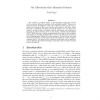Free Online Productivity Tools
i2Speak
i2Symbol
i2OCR
iTex2Img
iWeb2Print
iWeb2Shot
i2Type
iPdf2Split
iPdf2Merge
i2Bopomofo
i2Arabic
i2Style
i2Image
i2PDF
iLatex2Rtf
Sci2ools
119
click to vote
SODA
2008
ACM
2008
ACM
On allocations that maximize fairness
We consider a problem known as the restricted assignment version of the max-min allocation problem with indivisible goods. There are n items of various nonnegative values and m players. Every player is interested only in some of the items and has zero value for the other items. One has to distribute the items among the players in a way that maximizes a certain notion of fairness, namely, maximizes the minimum of the sum of values of items given to any player. Bansal and Sviridenko [STOC 2006] describe a linear programming relaxation for this problem, and present a rounding technique that recovers an allocation of value at least (log log log m/ log log m) of the optimum. We show that the value of this LP relaxation in fact approximates the optimum value to within a constant factor. Our proof is not constructive and does not by itself provide an efficient algorithm for finding an allocation that is within constant factors of optimal.
Algorithms | Constant Factors | Max-min Allocation Problem | SODA 2008 | Various Nonnegative Values |
Related Content
| Added | 30 Oct 2010 |
| Updated | 30 Oct 2010 |
| Type | Conference |
| Year | 2008 |
| Where | SODA |
| Authors | Uriel Feige |
Comments (0)

